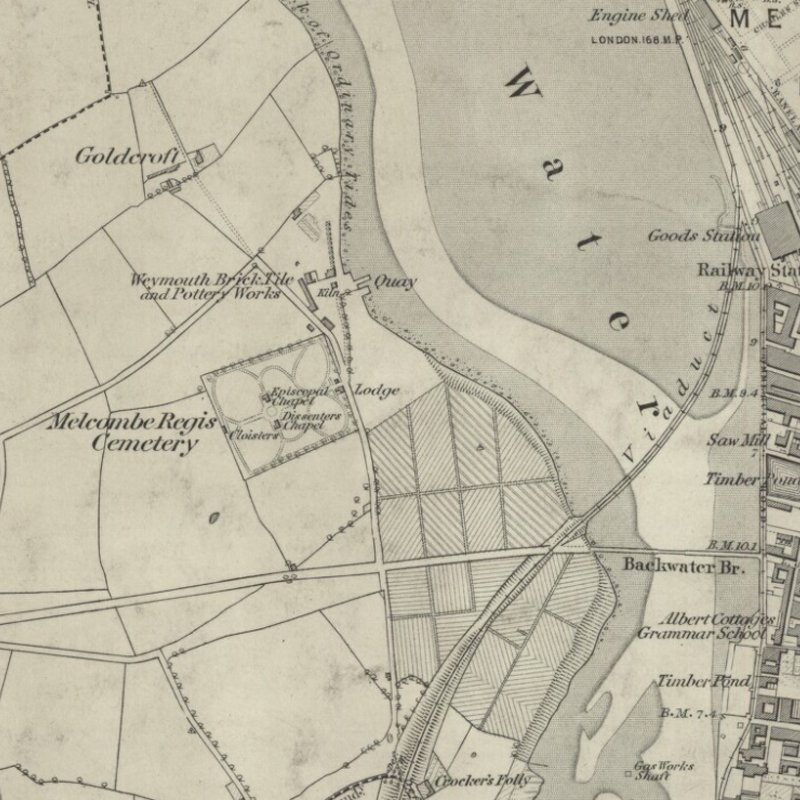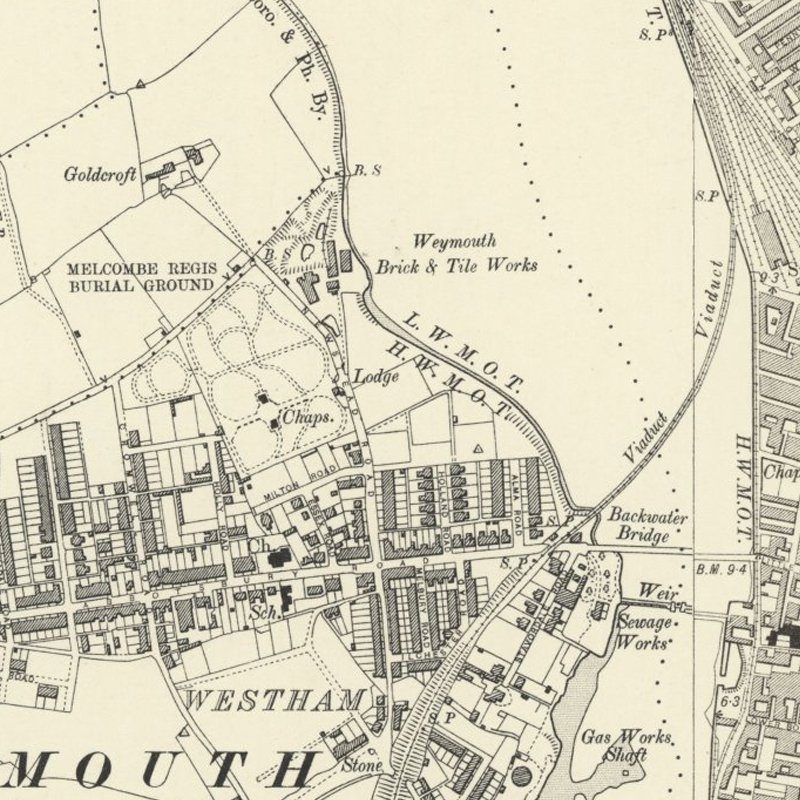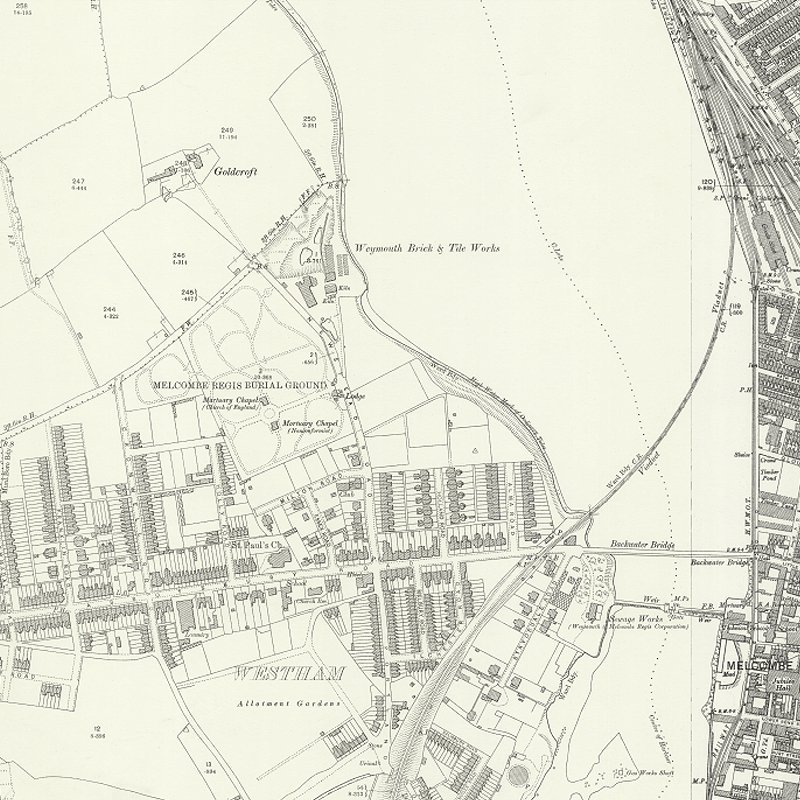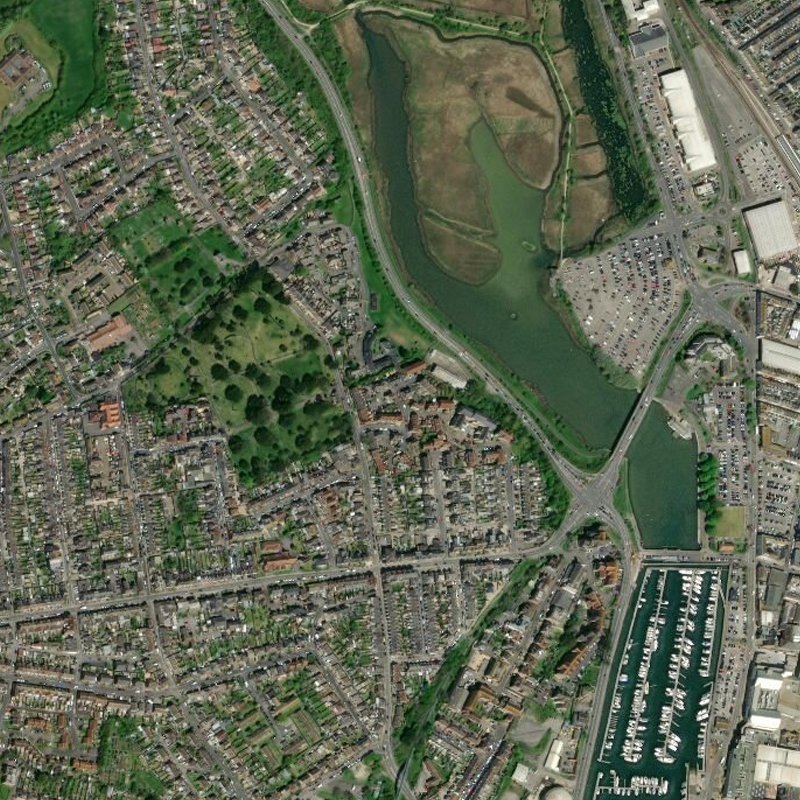Weymouth Oil Works
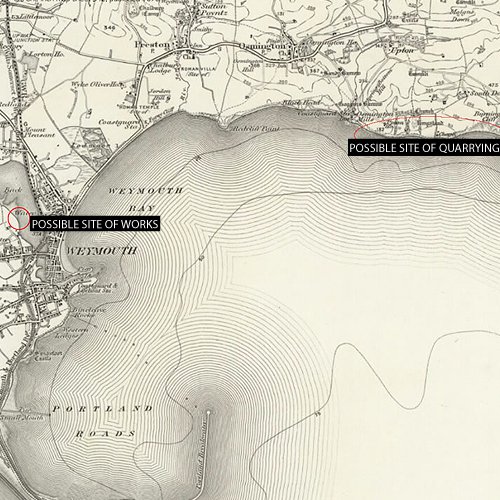
The Weymouth Oil Works were completed early in 1850, operated for only about six months, before lying unused for more than a decade. The works are described as being situated "on the borders of the River Wey, opposite the Great and South-Western Railways", most likely on a site subsequently developed as the Weymouth brick, tile and pottery works. The waterside site would have been well suited for receiving supplies of oilshale by small boat from workings along the Dorset coast.
The first references to the works appear in the press early in 1846 which record that "several eminent chemists from France have been experimenting here for some time on its properties, and have now concluded a contract for large quantities". This seems likely to refer to Michel DuBuisson, a French chemist associated with the shale oil industry in Autun, where shale oil had been manufactured since 1839. In 1845 DuBuisson had taken out a British patent for a design of retort that involved the use of steam to extract the oil from shale.
John Braithwaite and partners took out a licence for the use of DuBuisson's patent and begun construction of the Weymouth Oil Works in 1849 (or earlier). Braithwaite became bankrupt during this period, seemly as a consequence of speculation in railway shares. Braithwaite's trustees appointed William Homersham, a prominent civil engineer, to complete the Weymouth Oil Works and start production. Homersham but seems to have had little experience in chemical engineer. Giving evidence at the Young v. Clydesdale court case in 1860, Homersham stated that a stockpile of about 2,000 tons of oil shale existed at the works on his arrival. Some was "Weymouth shale", presumably from the cliffs in the vicinity of Osmington, but the majority came from Kimmeridge.
Homersham retorted only 100 tons of shale, yielding just 600 gallons of crude oil. Elaborate advertisements were placed in many newspapers for this "liquid bitumen", indicating that it contained a range of oils and tars. It was later admitted that the wording of the advertisement simply quoted the claims of DuBuisson's patent and that no effort was made at Weymouth to refine the crude mixture. No further production took place and efforts to sell the "liquid bitumen" continued for several years.
The works remained in the ownership of Braithwaite's trustees until the site was sold in 1862.
Number of Retorts: Unknown number of DuBuisson retorts.
Mapped by the Ordnance Survey of c.1898 (1" OS), showing the presumed oil works site in relation to the presumed source of shale.
WEYMOUTH. February 28.
A company is being formed in our immediate neighbourhood of rather a novel character—namely, for the manufacture of a kind of naphtha or oil, from the bituminous clay found in large quantities Osmington, Purton, and the lands adjoining. It was a stratum this nature that ignited some years ago at Ringstead, and caused that phenomenon, "the Burning Cliff," so long an object of interest here. Some experiments have been made by an eminent chemist from France, and he has spoken of it as likely to prove a most advantageous speculation. We understand that a contract has been agreed upon, and that large tract of land will soon be under active operations, and be the means, we trust, giving employment to many of our poor, superabundant labourers.
Salisbury and Winchester Journal, 28th February 1846
.......
New Manufacture of Naphtha.
A manufacture of a novel character, is about to established Weymouth, for the production of kind of naptha, or oil; the bituminous clay near the Burning Cliff is the source from whence it is to be extracted. Several eminent chemists from France have been experimenting here for some time on its properties, and have now concluded a contract for large quantities. In order to carry out their speculations, furnaces are to be erected forthwith, which, we hope, will furnish employment for our surplus stock of labourers.
Sherborne Journal, quoted in the Glasgow Herald, 10th April 1846
.......
Discovery of New Light.
Most our readers have heard of "the burning cliff" at Weymouth. The stratum of earth of which it is composed is bituminous substance, called shale, or schistus and a company has lately been formed for converting it into an oil, which bums with remarkable brightness. The light is nearly white, and is well adapted for lighthouses and railway signals, as well as for other purposes. It has. moreover, the great recommendation of cheapness, which is a not unimportant consideration. Whether it will answer for in-door purposes also is not yet ascertained, but the opinion is that it will, and entirely supersede naphtha and camphine.
Bell's Life in London and Sporting Chronicle, 16th December 1849
.......
Tenders for the erection of two chapels, Lodge and receptacle house, gates &c in the intended new burial ground for this parish situate at Wall Mead, near the shale works in the parish of Wyke Regis
Dorset County Chronicle, 12th April 1855
.......
WEYMOUTH, DORSET TO CAPITALISTS, BUILDERS, AND OTHERS.
In the Month July next will be OFFERED for SALE by public auction, by Mr. J. POTHECARY, At the Golden Lion Hotel, that Valuable COPYHOLD LAND of INHERITANCE, with the BUILDINGS thereon, and known the SCHISTE WORKS.
These Works having been erected at great expense for the conversion of Schiste or Beturainous Shale into Oils Spirits, &c., on land composed of some of the best clay in the neighbourhood, and situate on the borders of the River Wey, opposite the Great and South-Western Railways, are well adapted for a Pottery, any other purpose requiring large premises, with convenience of transit for good &c.
At the same time will be OFFERED FOR COMPETITION,—That most Desirable PIECE of FREEHOLD BUILDING LAND, known as the RAILWAY YARD, opposite the Stations of the above-mentioned Railways, having in continuation of Richmond Terrace, facing the river, a frontage of 300 feet or thereabouts.
Also Freehold Cottages, Gardens, Stables, and Premises, in King-street, Melcombe Regis, facing the Termini of the said Railways, and suitable for Hotels, Shops, or other Business purposes. The above, with other premises, will be offered in Lots or otherwise, to meet the convenience purchasers, details of which will shortly appear. For further particulars apply to Mr. C. B HENNING, Solicitor, Dorchester; Mr. R. N. Howard, Solicitor. Weymouth; or the AUCTIONEERS, Weymouth. Dorchester, June, 1862.
Dorset County Chronicle, 3rd July 1862


